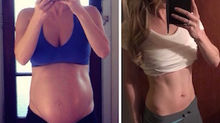Pregnancy Fitness, what do we need to know?
- Lisa Hansen
- Jan 6, 2017
- 3 min read
Updated: Sep 16, 2020

We've all heard it before, the standard "listen to your body" response to pregnancy and postnatal fitness. But is this actually an effective guideline?
I have been guilty of offering this advice myself in the past. As I have gained more experience working one on one with clients over the years I have realised how large an assumption it is that we are all in tune with our bodies, that we will notice or understand the cues alerting us of potential harm. As an example, so many of my clients have initially been unable to connect with their deep lower abdominal muscle, transversus abdominis (TA).. the common instruction most of us are familiar with "lower belly to spine" is useless without that mind/body connection allowing us to recruit the TA muscle... so without that base understanding of muscle engagement how can someone be expected to know when they are moving incorrectly. Further, when we are pregnant everything feels different - I have yet to find a heavily pregnant women, including myself, that could feel her TA engaging.
On top of that, we have a new hype around pregnancy fitness.. an almost competitive side to it with a surge in cross-fitters-turned-celebrities posting daily images of their workouts. While I think it's great that women are taking charge of their health, there is little conversation about the consequences of inappropriate exercise regimes FOR THE INDIVIDUAL. When there is an element of adrenaline it can of course make it harder to "listen to your body".
In my experience during my pregnancy I was told by my GP I could carry on as usual, however I was never asked what kind of exercise I do, whether I was aware of diastasis recti, or if I had an experienced trainer in pregnancy exercise guiding me. As a pre and post natal exercise instructor I am very aware of the effect exercise can have on a pregnant woman's body, it will either help to strengthen the core and pelvic floor muscles, or it will put excess pressure/stress on an already weight loaded/stretched body.. which may feel ok at the time but can seriously interfere with pregnancy and childbirth recovery - just because you CAN do something doesn't mean you should..
women who think they are doing the right thing staying active during pregnancy may infact be doing more harm than good to their body when they are not aware of the risk factors for common issues, such as diastasis recti or pelvic floor dysfunction.
There is so much research to support the benefits of pelvic floor strengthening exercises in pregnancy and post natal that long term incontinence and pelvic floor issues certainly shouldn't be expected or the norm. Currently the stats are one in three women experience pelvic floor dysfunction (*Incontinence NZ). It is important to be aware that in New Zealand PT and group fitness instructors do not have to have any special qualification to work with pre and postpartum women. Currently our PT courses do not go into any real depth on the implications of incorrect exercise for this very large group of women and pelvic floor dysfunction is barely covered.
- "...Removing fear and confusion is the first step in making pre and postnatal exercise accessible. Basic guidelines are available - although they are not ideal, and of course can't be right for everyone, they are somewhere to start! There are plenty of trainers, like myself, that are dedicated to changing how we approach pre and postnatal fitness. Pelvic floor health is gaining more and more attention in the fitness industry and we are becoming more open about sensitive issues. I hope that we are able to empower women to have the confidence and courage to ask when they have questions or concerns and the knowledge that they are not alone..."




















Comments